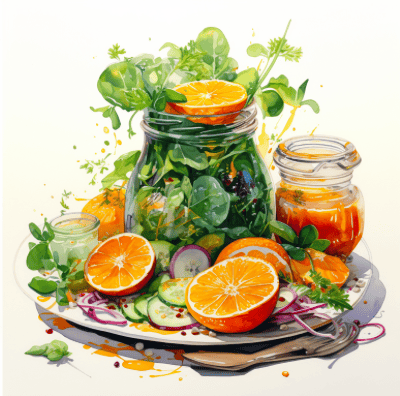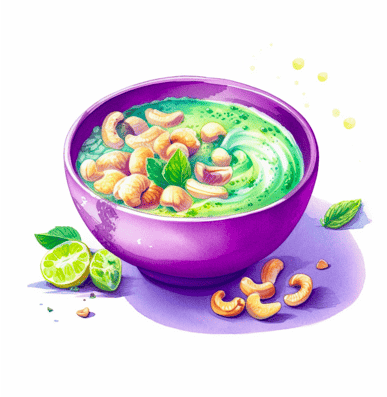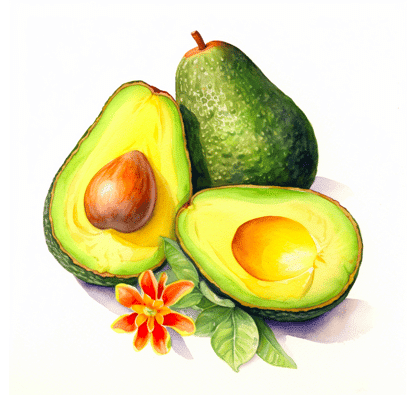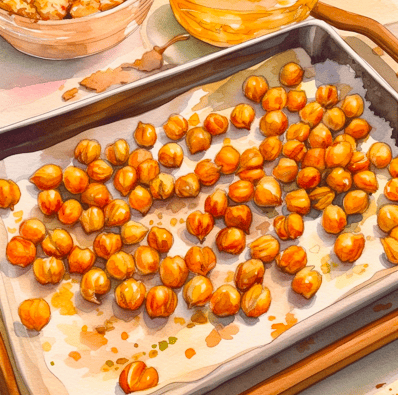
Don’t want to read the whole post?
While there are various factors that contribute to the development of varicose veins, including genetics and lifestyle, adopting a healthy plant-based diet can play a significant role in managing and potentially preventing further progression of this condition.
Eating more easy-to-eat plant-based foods filled with vitamins C and E, and fibre are the easiest ways to start creating your best varicose vein diet plan today.
ABOUT ME
Be beauty. Be plant-based!
As a former Registered Nurse and avid plant-muncher, I’m in love with how simple plant-based foods make it so easy to be beautiful.

You might also like:
Feasting for Follicles: Best Foods for an Alopecia Diet Plan
Emmy sits on her couch, her legs propped up on a cushion. As she scrolls through her social media feed, she notices a picture of her friends enjoying a hiking trip. A wave of disappointment and shame washes over her as she realises that her worsening varicose veins have been keeping her from the activities she loves.
With her hand resting on her legs, Emmy can’t help but wonder if her diet has any impact on her vein health. She once read that good nutrition was important for maintaining healthy veins, and how certain vitamins and minerals can promote blood circulation and help prevent blood clots.
Maybe she could regain control over her appearance with a little bit of action?
Emmy grabs her phone and starts researching the best foods for vein health. She learns that vitamin C is essential for collagen production, which can help strengthen the walls of her veins. She scribbles down a list of great tasting citrus fruits and leafy greens that are rich in this vital nutrient.

Skip to: Easy Plant-Based Foods Packed with Vitamin C
Going deeper into her research, Emmy discovers that foods high in fibre can prevent water retention and promote regular bowel movements, which reduces the likelihood of getting varicose veins. She makes a mental note to add more whole grains, beans and chickpeas, and vegetables to her grocery list.
Skip to: The Surprising Relationship Between Constipation and Varicose Veins
Emmy knows that maintaining a healthy weight is crucial for reducing the pressure on her veins. She finds herself excited about the prospect of incorporating more low-sodium, nutrient-dense foods into her daily meals. The thought of nourishing her body with the right ingredients and potentially alleviating her symptoms fills her with a newfound determination.
As Emmy wraps up her research, she reflects on the potential positive impact of making dietary changes. She imagines a future where she can comfortably wear skirts again without worrying about the appearance of spider veins. More importantly, she envisions being able to fully engage in physical activities, free from the discomfort and limitations caused by her varicose veins.

Armed with knowledge and a renewed sense of empowerment, Emmy is ready to take charge of her vein health. She eagerly heads to the grocery store, determined to fill her cart with the best foods to support her overall health and well-being.
The Best Diet for Varicose Veins: A Plant-Based Diet
A plant-based diet can have a powerful impact on vein health. Plant-based foods are rich in vitamins, minerals, and phytonutrients that support vein health and reduce inflammation in the body. By focusing on consuming a variety of fruits, vegetables, whole grains, legumes, and nuts, individuals can provide their bodies with essential nutrients, antioxidants, and fibre. These elements contribute to strengthening vein walls and promoting overall circulation.
You may also like: Plant-Based Perks: Weight-Loss Made Easy

Can You Turn Back Time? The Role of Diet in Reversing Varicose Veins
While diet alone may not completely reverse varicose veins, it can play a role in managing the condition and preventing further progression. Varicose veins are a result of weakened vein walls and impaired blood flow. A healthy plant-based diet can help improve blood circulation, reduce inflammation, and provide the necessary nutrients to support vein health. However, it’s important to note that a holistic approach that combines diet, exercise, and medical interventions where required is the best approach.
Key Nutrients for the Best Varicose Veins Diet
Several key nutrients have been associated with promoting vein health. Vitamin C is essential for collagen production, which helps maintain the integrity of vein walls. Foods rich in vitamin C, such as citrus fruits, berries, and leafy greens, should be included in a vein-friendly diet. Additionally, foods high in vitamin E, bioflavonoids, and omega-3 fatty acids can also contribute to strengthening veins and reducing inflammation. Sources of these nutrients include nuts, seeds, whole grains, and dark leafy greens.
Easy Plant-Based Foods Full of Vitamin C
- Citrus fruits: Oranges, lemons, grapefruits, and tangerines are well-known for their high vitamin C content. Enjoy them as a refreshing snack, squeeze them into a glass of water for a citrusy boost, or incorporate their zest and juice into your recipes.
- Berries: Strawberries, raspberries, blueberries, and blackberries are not only delicious but also packed with vitamin C. Add them to your breakfast cereal, smoothies, or enjoy them as a standalone snack.
- Kiwi: This small, fuzzy fruit is a vitamin C powerhouse. Slice it up and eat it on its own or add it to fruit salads, smoothies, or even savoury dishes for a tangy twist.
- Papaya: This tropical fruit is not only rich in vitamin C but also provides digestive enzymes and fibre. Enjoy it sliced or use it in smoothies, salsas, or salads for a tropical twist.
- Bell peppers: Whether red, green, or yellow, bell peppers are an excellent source of vitamin C. Enjoy them raw in salads, stir-fried in dishes, or roasted for a deliciously sweet and tangy flavour.
- Leafy greens: While not as high in vitamin C as citrus fruits, leafy greens like kale, spinach, and Swiss chard still provide a notable amount. Add them to salads, soups, or sauté them as a nutritious side dish.
Worried about eating extra fruit and your waistline?
Don’t be! Find out how in:
Eating More to Weigh Less: Fruitful Freedom
Easy Plant-Based Foods for Vitamin E

- Almonds: These nutrient-dense nuts are a great source of vitamin E. Enjoy them as a snack or add them to your salads, oatmeal, or homemade granola.
- Sunflower Seeds: These tiny seeds are rich in vitamin E and make a delicious and nutritious addition to your diet. Sprinkle them on salads, stir them into yogurt, or enjoy them as a standalone snack.
- Spinach: This leafy green vegetable not only provides an array of nutrients but is also a good source of vitamin E. Incorporate spinach into your salads, smoothies, or sautéed dishes for a boost of this essential vitamin.
- Avocado: Besides being a creamy and delicious fruit, avocados are a natural source of vitamin E. Enjoy avocado slices on toast, in salads, or blend them into smoothies for a creamy texture and added nutrients.
- Wheat Germ: Wheat germ is the nutrient-rich part of the wheat kernel and contains a good amount of vitamin E. Sprinkle wheat germ on your cereal, yogurt, or incorporate it into your baked goods for an extra dose of this vitamin.
You’ll also love:
The Nutty Truth: Munch More Nuts to Weigh Less!
The Best Drinks for Vein Health
Hydration plays a crucial role in supporting vein health. Optimal hydration helps maintain blood viscosity and promotes proper circulation. Water is the best choice for staying hydrated, as it is free of added sugars and additives. However green tea is my favourite as it helps create smoother, hydrated skin as well. Herbal teas, such as chamomile or ginger tea, can also be beneficial for their anti-inflammatory properties. Additionally, certain juices, like pomegranate or beet juice, are rich in antioxidants and can support vein health. However, it’s important to moderate the consumption of juices due to their natural sugar content.

From Bowels to Veins: Constipation and Varicose Veins
Constipation and varicose veins may seem unrelated, but there is actually a connection between the two. Constipation refers to infrequent bowel movements or difficulty passing stool, and can lead to increased pressure in the abdomen which puts additional strain on the veins. With additional strain in the veins in your legs, this can lead to the development or worsening of varicose veins.
Further, chronic constipation can contribute to water retention and bloating, leading to increased fluid buildup and swelling in the legs. This can further exacerbate symptoms of varicose veins and contribute to discomfort and heaviness in the affected areas. Therefore the best diet for varicose veins has a focus on preventing constipation.
To help prevent constipation and alleviate its impact on varicose veins, it is essential to maintain a healthy lifestyle and follow a balanced diet. Including fibre-rich foods, such as fruits, vegetables, whole grains, and legumes, can promote regular bowel movements and prevent constipation. Staying well-hydrated, exercising regularly, and managing stress levels are also beneficial in supporting optimal digestive function and vein health.

My favourite way to increase legumes in my diet is to eat crispy spiced chickpeas:
- The Crispiest Oil-Free Roasted Chickpeas by Geoffrey Allan
- Tandoori Chickpea Stuffed Sweet Potatoes at RainbowPlantLife
Fibre-Rich Foods
One of the key components in preventing constipation is increasing your intake of fibre-rich foods. Fibre adds bulk to the stool, making it easier to pass through the digestive system. Whole grains, fruits, vegetables, legumes, and nuts are excellent sources of dietary fibre. Including these foods in your meals and snacks can help regulate bowel movements and prevent constipation.
Hydration
Staying hydrated is crucial for maintaining healthy digestion and preventing constipation. Water helps soften the stool, making it easier to pass. Aim to drink an adequate amount of water throughout the day, and consider incorporating hydrating foods such as watermelon, cucumbers, and citrus fruits into your diet. These foods not only provide hydration but also contribute to your overall nutrient intake.
Probiotic-Rich Foods
A healthy gut flora plays a significant role in promoting regular bowel movements. Probiotic-rich foods such as yogurt, kefir, sauerkraut, and kimchi contain beneficial bacteria that support digestive health. These foods can help maintain a balanced gut microbiome, which in turn can help prevent constipation. Consider including a variety of probiotic foods in your diet to support your digestive system and overall well-being.
Healthy Fats
Including healthy fats in your diet can also contribute to smooth digestion and prevent constipation. Foods rich in omega-3 fatty acids, such as flaxseeds, and chia seeds, can help lubricate the intestines and promote regular bowel movements. Additionally, incorporating moderate amounts of avocados, and nuts into your meals can help keep your digestive system functioning optimally.
Preventing constipation is essential for maintaining vein health and minimising the risk of varicose veins. By incorporating fibre-rich foods, staying hydrated, consuming probiotic-rich foods, including healthy fats, and enjoying herbal teas, you can support your digestive system and promote regularity. However ultimately the best diet for varicose veins is the diet the version of a plant-based diet that works for you. Remember to listen to your body, make gradual dietary changes, and consult with a healthcare professional if you have any specific concerns or medical conditions.